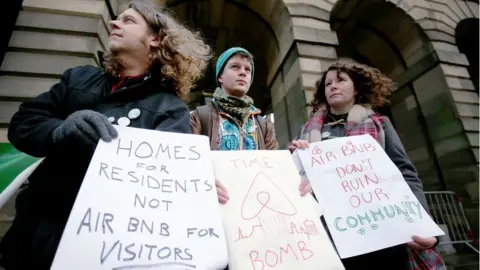New rules passed for short-term lets in Scotland
 Getty Images
Getty ImagesMSPs have passed new regulations which require landlords to have licences for short-term lets.
The Scottish government tabled the plan to tackle the growth of rentals on platforms like Airbnb in popular tourist areas like Edinburgh.
The regulations passed by 68 votes to 53.
Councils will each have to devise a licensing system for such properties by October.
All short term let properties will require a licence by 1 July 2024.
Fees to apply for a licence are uncapped under the government's plans, with individual local authorities able to set their own rate.
The Scottish government had previously hoped to introduce the new law before May's Holyrood election but pushed the plans back following criticism from some MSPs.
Speaking in parliament on Wednesday, Housing Secretary Shona Robison said: "We recognise the important role short-term lets play as a source of flexible and responsive accommodation for tourists and workers, which brings many benefits to hosts, visitors and our economy.
"However, when this work started in 2018 it was in response to the significant concerns of residents and communities across Scotland... about the impact that short term lets were having on their areas, including on local housing supply, noise and antisocial behaviour.
"I'm pleased that we have responded to those concerns with the clear action we have taken tonight."
 PA Media
PA MediaTory MSP Miles Briggs spoke against the move as it was set for its final legislative hurdle, claiming he was not against curbs, but would prefer a registration scheme.
He said: "Given the impact that the pandemic has had, we should be mindful of the unintended consequences and the potential negative impact which these new regulations will have on already fragile tourism businesses.
"What is concerning is that the views of this sector has not been taken on board and a workable solution which has been put forward in the form of the registration scheme has been put to one side by SNP ministers."
'Businesses could close'
Scottish Land and Estates, which has consistently been against the regulations, said it was "extremely disappointed" by their passage.
Simon Ovenden, the group's policy adviser, said: "While we understand the need for action in some localised situations, we have constantly warned of the dangers of a one size fits all approach.
"This urban-focused licensing order being imposed on rural Scotland, with evidence suggesting that the excessive bureaucracy and spiralling costs could now lead to many businesses closing with a knock-on impact to the local communities they serve.
"This is particularly disappointing given the significant difficulty rural businesses have faced during the last two years."
